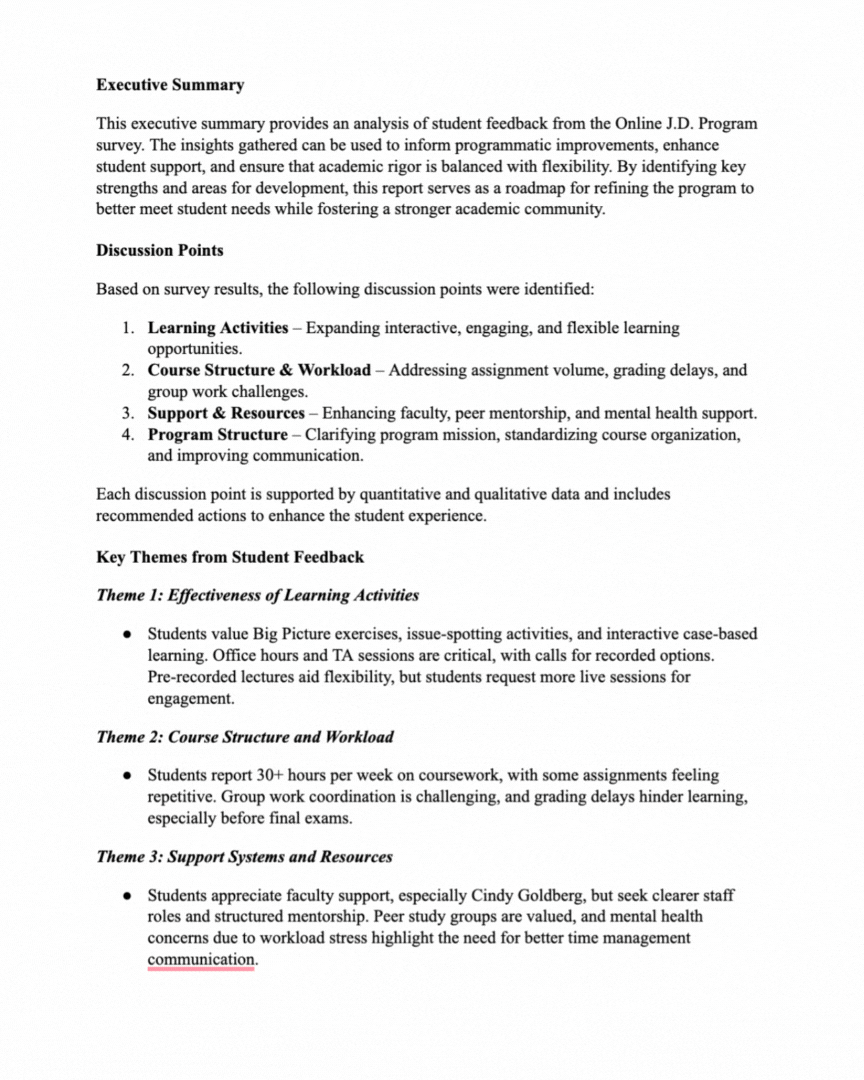Online J.D. Program Survey
Client:SWLS Online J.D Program
Project Type:Mixed-Methods Program Evaluation + Strategic Recommendations
Industry Intersection:Legal Education + Data-Driven Program Evaluation + Equity-Centered Online Learning
Co-Authors On This Project:Dr. Elizabeth Anderson, EWRG & Joy Polk, E.A.S.E
Overview
Fradely Delacruz co-conducted a comprehensive analysis of quantitative and qualitative data from the Online J.D. Program Survey to support program improvements, elevate equity, and redesign the student experience for a diverse population of working professionals. Utilizing Google Form survey exports, pivot tables, chi-square testing, and thematic coding, the project surfaced clear recommendations across academic structure, student well-being, and administrative support.
Description
Fradely co-led a collaborative evaluation effort, applying both statistical and qualitative rigor. She mapped survey items to actionable discussion points and created a strategic report that synthesized student experiences across four key themes: learning activities, course structure, support systems, and program transparency. Her interpretation approach blended inferential statistics (chi-square testing), sentiment-coded quote analysis, and culturally responsive design to identify hidden inequities and program strengths. The appendix featured a comprehensive codebook that linked qualitative insights with academic references and classified participants' tones and emotions.
Deliverables
Mixed-Methods Final Report: Authored a 20+ page strategic report, including tables, graphs, codebook, program evaluation, and narrative synthesis of survey data
Quantitative Insights: Produced pivot tables and chi-square interpretation to examine intersections of employment, caregiving, and workload
Qualitative Codebook: Developed a structured thematic codebook with tone sentiment, academic citations, and direct student quotes
Recommendations Framework: Organized all suggested actions by short-term, mid-term, and long-term priorities aligned to participant experience, stakeholder capacity, and program initiatives.
Appendix & Supplement: Delivered a 50-page supplemental appendix with interactive visuals, outlier analysis, and program evaluation rubrics
Community-Driven Strategy: Proposed a participatory improvement model including student working groups, peer-led networks, and collaborative program feedback loops
Key Outcomes
Identified that 56.25% of part-time students were also full-time employees, and 46.94% were caregivers—insights that directly informed the reshaping of some workload expectations, course design, skill mastery pathways, and flexibility policies.
Reframed the course design strategy to balance asynchronous engagement with live support based on student readiness and feedback loops.
Proposed equity-first strategies such as mentorship pairings, law-in-practice simulations, and structured career pathways for online learners.
Demonstrated statistically significant insights using chi-square tests to inform course improvements, enhance the student experience, and guide program instructional design.
Translated raw feedback into student-voiced reform language that strengthened administrative trust and stakeholder engagement for the presentation of results.
Created a sustainable model for recurring program feedback and student-led assessment cycles, including a data management plan.
Luziaries Value: Education
This project exemplifies Luziaries' ability to lead data-informed transformation rooted in equity, student voice, and interdisciplinary analysis. Through the integration of statistical interpretation and qualitative methods, Fradely delivered high-impact strategies to ensure students' voices were heard while strengthening digital legal education rooted in research insights.


